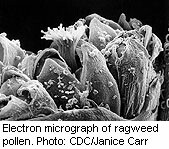Adenosine found to aggravate ragweed-induced allergic lung inflammation
THURSDAY, May 14, 2015 (HealthDay News) — Pollen-derived adenosine is an important element in ragweed pollen-induced allergic airway inflammation, according to a study published online May 2 in Allergy.
Maria Wimmer, Ph.D., from the Technische Universität München, and colleagues examined critical factors for allergenicity of ragweed pollen in a physiologic model of allergic airway inflammation. They instilled aqueous ragweed pollen extract, the low molecular weight fraction, or major allergen Amb a 1 intranasally on one to 11 consecutive days. Allergic airway inflammation was assessed. In order to examine the role of pollen-derived adenosine in ragweed-induced allergy, it was removed from the extract enzymatically. The authors also examined migration of human neutrophils and eosinophils toward supernatants of ragweed-stimulated bronchial epithelial cells.
The researchers found that specific immunoglobulin G1, pulmonary infiltration with inflammatory cells, a Th2-associated cytokine signature in pulmonary tissues, and impaired lung function were induced by instillation of ragweed pollen extract, but not of the major allergen or the low molecular weight fraction. Ragweed-induced allergic lung inflammation was aggravated by adenosine. If adenosine was present, human neutrophils and eosinophils migrated toward supernatants of bronchial epithelial cells stimulated with ragweed extract in vitro.
“Pollen-derived adenosine is a critical factor in ragweed-pollen induced allergic airway inflammation,” the authors write. “Future studies aim at therapeutic strategies to control these allergen-independent pathways.”
Copyright © 2015 HealthDay. All rights reserved.








